Compatibility with H series PLC utilizes valuable existing user programs
- EH-150's CPU has two communication ports : Port 1 and Port 2.
- Port 1 can be used as a dedicated port and can be switched to a general-purpose port. It also supports the modem control function (except for EH-CPU104A).
- Port 2 can be used as a dedicated port for programming devices. When a general-purpose port is designated, the TRNS command can be used, making operation easier and improving connectivity.
- The interface can be selected from RS-232C, RS-422, and RS-485 for port 1 general-purpose port and the port1 dedicated port (EH-CPU316A, EH-CPU516, EH-CPU548).
When Port 1 is used as a dedicated port
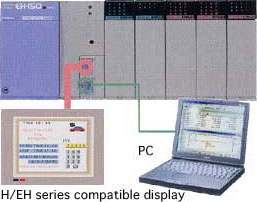
Multi-link connection of display
(EH-CPU316, EH-CPU516, EH-CPU548) Port 1 can be switched among RS-232C, RS-422, and RS-485. Task code communication with a station number by HI-PROTOCOL can be supported using RS-422.
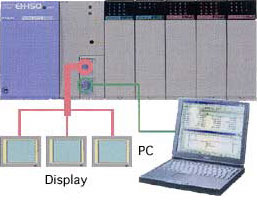
When Port 1 is used as a general-purpose port
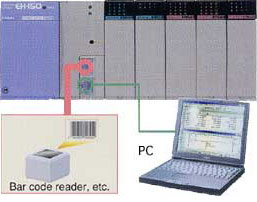
A memory board that can read and write programs can be loaded in the CPU.(EH-CPU316A, EH-CPU516, EH-CPU548)
Transferring and comparing programs can be done without a programming device. The CPU can be operated with the program on the memory board.
A memory board that can store data (384k words) in addition to the program is also available (EH-MEMD). The memory board employs a battery-less Flash memory to make maintenance easier.
Sizes of programs that can be transferred to each CPU
| CPU model |
Program transfer
size |
Memory board
→CPU |
Memory board
←CPU |
Memory board
= CPU |
| EH-MEMP |
EH-MEMD |
EH-MEMP |
EH-MEMD |
EH-MEMP |
EH-MEMD |
| EH-CPU516 |
16 k steps
or less |
○ |
○ |
○ |
○ |
○ |
○ |
| Over 16 k steps |
 |
 |
— |
— |
 |
 |
| EH-CPU548 |
16 k steps
or less |
○ |
○ |
○ |
○ |
○ |
○ |
Over 16 k steps
and
48 k steps
or less |
○ |
— |
○ |
— |
○ |
— |
○ : Executable
 : Not executable because of error
: Not executable because of error
— : This event does not occur
The compact and stylish EH-150 meets various automation requirements
- As many as 704 I/O points can be configured on the EH-150, which is only 462.5 mm (W) × 100 mm (H) × 109 mm (D) in size.
- The EH-150' s compact size helps reduce machine size and save installation space, and its bright color and sleek design adds aesthetic appeal to the entire system.
The modem connection capability incorporated as a standard feature allows for 38.4 kbps high-speed communication (EH-CPU316A, 516, 548)
- Port 1 of EH-150' s CPU (except for EH-CPU104A) has a modem connection function that supports 38.4 kbps high-speed communication.
- The control operation can be remotely monitored through the public telephone line.
- The clock function also incorporated as a standard feature realizes real-time control without an additional module.
- LADDER EDITOR for WindowsW Ver. 2.0 or after has the dial-up function. It is possible to connect to the public telephone line using the software.
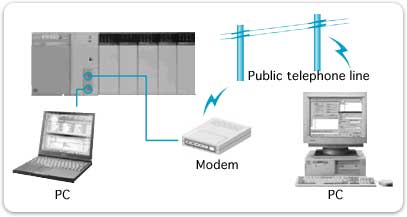
The state-of-art technologies and functions realize high-speed processing of complicated control
- The EH-150 contains a 32-bit RISC processor (Super H series made by Hitachi, Ltd.) that allows high-speed operations.
- To protect valuable programs from being erased, the EH-150 has a Flash memory for storing user programs.
- As many as 153 commands are available (EH-CPU516/548). Commands such as REFRESH assure quick response to high-speed operation of assembly machines.
Compatibility with H series PLC utilizes valuable existing user programs
- The same programming software 'LADDER EDITOR' can be used.
- LADDER EDITOR for Windows® provides easier programming and debugging with its comfortable operation environment.
- Various types of displays and monitoring software compatible with the H series PLC can be used as peripheral equipment
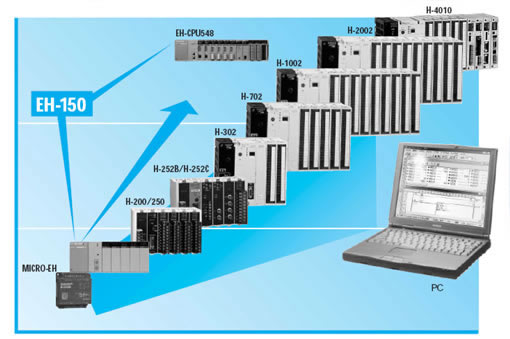
The EH-150 is easy to maintain even after installed in a machine
- Flash memory protects user programs even if the power fails.
- Programs can be easily modified even while the CPU is running. This helps reduce the time required for a test run.
- Easy installation by snapping on a DIN rail
- Removable terminal block for easy set-up
- The battery for data memory back-up can be replaced by opening the hinged front cover of the CPU.





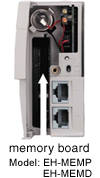
![]() : Not executable because of error
: Not executable because of error


